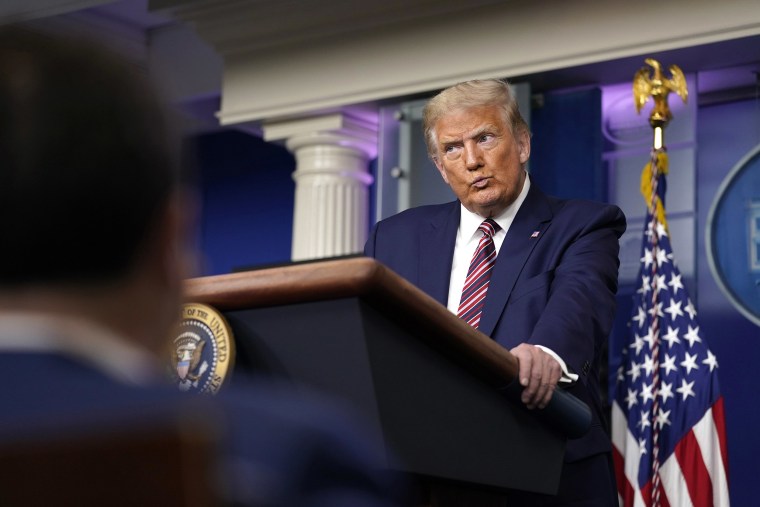The first real breakthrough on understanding Donald Trump's controversial finances came exactly two years ago this week, when the New York Times reported on evidence of "dubious tax schemes" and "outright fraud" that Trump exploited to receive hundreds of millions of dollars from his father. The findings painted a picture in which the president, far from the self-made man he pretends to be, relied heavily on legally dubious family handouts.
In May 2019, the Times advanced the story, shining a light on the future president's finances from the mid-1980s to the mid-1990s, when Trump went from one failed venture to another, losing money at an extraordinary pace. At one point, the reporting noted, Trump "appears to have lost more money than nearly any other individual American taxpayer."
Last night, the president suffered strike three.
The New York Times obtained two decades of President Donald Trump's tax information, reporting Sunday that the president paid only $750 in federal income taxes the year he won the presidency and again during his first year in office. The Times ... reported that Trump has not paid any income taxes in 10 of the past 15 years, mostly because he reported significant losses. It reported that Trump is facing a decadelong Internal Revenue Service audit over a $72.9 million tax refund he received that could end up costing him more than $100 million.
Those who've wondered why the president has fought tooth and nail to hide his financial records from the public should wonder no more.
The Times' new reporting is extensive, but well worth your time. The main report is accompanied by a summary of the most brutal revelations from the reporting, as well as a deeply damaging timeline highlighting the Republican's financial difficulties over the last several years.
Before getting to the forest, it's worth dwelling on some of the trees. It's difficult to imagine, for example, how Trump managed to pay so little in taxes, despite the scope of his wealth. Indeed, the records show he ended up paying more to other countries' governments than his own.
What's more, the president's financial future appears likely to get worse: he's "personally responsible" for hundreds of millions of dollars in loans and other debts, with payments due over the next four years. The reporting adding, "Should he win re-election, his lenders could be placed in the unprecedented position of weighing whether to foreclose on a sitting president."
But the bigger picture is equally devastating: Trump spent decades failing as a businessman, while pretending to be a private-sector titan. He was rescued by a reality-television program that improved his finances and created marketing opportunities, but as the show ran its course, Trump struggled anew.
Michael Cohen, his former fixer, has said Trump saw a presidential campaign as a way to help his flagging finances, and there's fresh evidence to believe the argument: "When Mr. Trump glided down a gilded Trump Tower escalator to kick off his presidential campaign in June 2015, his finances needed a jolt. His core businesses were reporting mounting losses — more than $100 million over the previous two years. The river of celebrity-driven income that had long buoyed them was running dry."
Similarly, after Trump has spent nearly four years trying to profit off his presidency, it's increasingly obvious why: many of his ventures have struggled badly and he needs the money.
The Times' reporting added, "The tax returns that Mr. Trump has long fought to keep private tell a story fundamentally different from the one he has sold to the American public. His reports to the I.R.S. portray a businessman who takes in hundreds of millions of dollars a year yet racks up chronic losses that he aggressively employs to avoid paying taxes. Now, with his financial challenges mounting, the records show that he depends more and more on making money from businesses that put him in potential and often direct conflict of interest with his job as president."
Much of the political chatter over the last 12 hours has focused on whether voters will care that they've played by the rules and paid their taxes, while their wealthy president appears to have done largely the opposite. It's obviously a relevant question, especially with voting already underway in parts of the country.
But just as important is the question of whether voters will care that Trump has been exposed as little more than a fraud. A charlatan. Quite possibly the single most successful con man in the history of the world.
The persona that the Republican has sold to unsuspecting voters is little more than a cardboard cutout, which Trump has hidden behind, hoping no one would notice the scope and scale of his failures.
For his part, the president held a press conference late yesterday afternoon, denouncing the revelations as "fake," and insisting that he paid "a lot" of taxes. Asked if he would produce documentation to support his claims, Trump said he would not.
